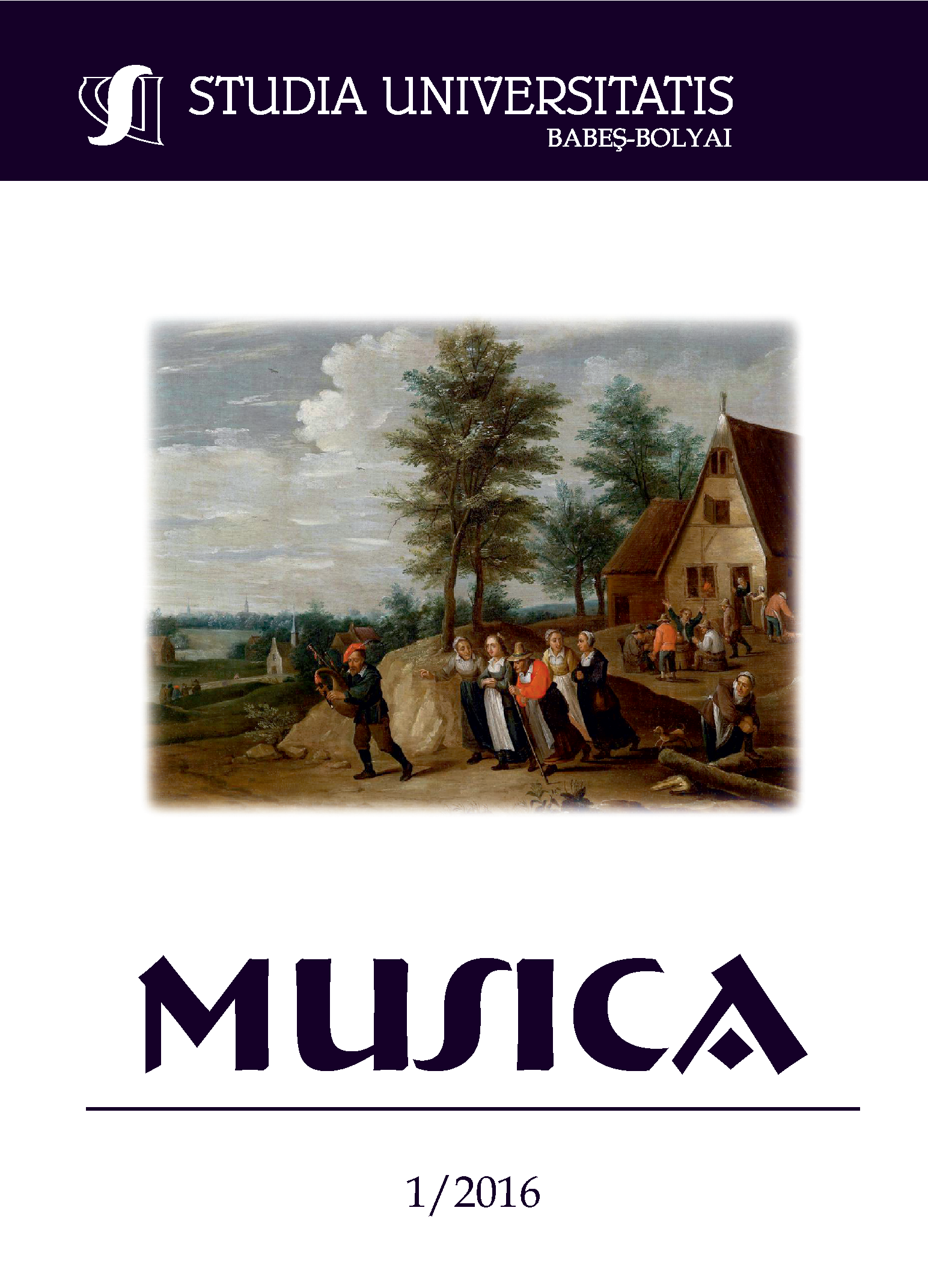THE QUOTATION IN TIBERIU OLAH’S “SINFONIA GIOCOSA (!?)”
Keywords:
quotation, intertextuality, Ode to Joy, trichord, Tiberiu OlahAbstract
The study starts with a brief debate on the nature of a text as interference space of preexisting texts or, on the contrary, as an original and autonomic reality. Different aspects of music quotation are then considered: cognoscibility, defamiliarization, incorporation of cultural associations and meanings, visibility, position and integration. The case study (analysis of Tiberiu Olah’s Symphony No.4) reveals an interesting way of incorporating the quotation. The main quotation, deriving from Ode to Joy, is clearly presented only in the end of the Symphony, although its deep structure (the trichord) constitutes the basis of the whole work. Even this late appearance is not a simple quotation; the Beethovenian fragment is transformed, the affirmation turning into a painful and uncertain interrogation. Beside the famous quotation, there are many others, more or less audible, coming from a variety of authors and music spheres (opera, religious music, chamber music, patriotic song, film music). Despite their diversity, the quotations are fastened by a common DNA (the trichord), the work acquiring thus a teleological, centripetal, ordering function.
References
Barenboim, Daniel, Everything is connected: The Power of Music, Weidenfeld & Nicolson, Great Britain, 2008.
Barthes, Roland, The Death of the Author (1968), in Image - Music - Text. Ed. and transl. Stephen Heath, Hill and Wang, New York, 1977, 142-148.
Bloom, Harold, A Map of Misreading, New York, Oxford University Press, 1975
Bloom, H., The Anxiety of Influence: A Theory of Poetry, Oxford University Press, Oxford, 1973.
Bradshaw, Susan, Class of '45, in The Musical Times, Vol. 136, No. 1825 (Mar., 1995), 139-141.
Buks, Eyal et al., Dephasing in electron interference by a ‘which-path’ detector, in Nature, Vol. 391, February 1998, 871-874.
Burkholder, Peter J., Borrowing, in New Grove Dictionary of Music and Musicians, ed. Stanley Sadie, 2nd edition, London: Macmillan Publishing, 2001, vol. IV, 5-41.
Cengher, Monica, Tiberiu Olah la 70 de ani – Muzica îndeamnă la introspecţie (Tiberiu Olah at 70 years – Music impels to introspection), interview in Muzica, No.1/1998, republished in “Tiberiu Olah – Restituiri” (Tiberiu Olah – Restitutions), Ed. O. Lupu, Ed. Muzicală, 2008, 277.
Cusanus, Nicolaus, Coincidentia oppositorum, Ed. Polirom, Iaşi, 2008.
Damasio, Antonio Eroarea lui Descartes; emoţiile, raţiunea şi creierul uman (Decartes’s Error: Emotion, Reason, and the Human Brain, 1994), Ed. Humanitas, Bucureşti, 2004.
Delaere, Mark et al., Mutations in Systems in the Natural Sciences and Music in the First Half of the Twentieth Century, in International Review of the Aesthetics and Sociology of Music, published by the Croatian Musicological Society, Vol.21, No.1 (Jun., 1990), 3-28.
Dumitru Constantin Dulcan, În căutarea sensului pierdut: Creierul şi noua spiritualitate (In searching of the lost sense: The brain and the new spirituality), Ed. Eikon, Cluj-Napoca, 2008.
Ekman, Paul et al., Universals and cultural differences in the judgments of facial expressions of emotion, in Journal of Personality & Social Psychology 53 (4), 1987, 712-717.
Ekman, P.; Friesen, Wallace V., Constants across cultures in the face and emotion, in Journal of Personality and Social Psychology (17), 1971, 124-129.
Emile Vuillermoz et al., Maurice Ravel par quelques-uns de ses familiers, Paris, 1939.
Fallas, John, Into the New Century: Recent Holloway and the Poetics of Quotation, in Tempo, Vol. 61, No. 242, Oct., 2007.
Foucault, Michel, What is An Author?, conference presented to the French Society of Philosophy in 22.02.1969.
Geiringer, Karl, Artistic interrelations of the Bachs, in The Musical Quarterly, Vol. 36, No. 3 (Jul., 1950), Oxford University Press.
Hanslick, Eduard, The Beautiful in Music, London, Novello and Company, 1891.
Heisenberg, Werner, Partea şi întregul (The Part and the Whole, 1969), Ed. Humanitas, Bucureşti, 2008.
Keppler, Philip Jr., Some Comments on Musical Quotation, in The Musical Quarterly, Vol. 42, No. 4 (Oct., 1956), 473-485, Oxford University Press.
Kristeva, Julia, Séméiotiké : recherches pour une sémanalyse, Seuil, Paris, 1969.
Locke, John, An Essay Concerning Human Understanding (1690), Ed. P.H.
Losada, Catherine, Between Modernism and Postmodernism: Strands of Continuity in Collage Compositions by Rochberg, Berio, and Zimmermann, in Music Theory Spectrum, Vol. 31, No. 1 (Spring 2009), 57-100.
Lupu, Olguţa, Tiberiu Olah, in Actualitatea muzicală, No.12/2012, 9.
Lupu, O., Tiberiu Olah – Croquis in a mirror. Correspondences between his musicological ideas and his activity as a composer, in Musicology Today, No.13, 2013.
Metzer, David, Quotation and Cultural Meaning in Twentieth-Century Music, Cambridge University Press, 2003.
Meyer, Leonard B., A Universe of Universals, in The Journal of Musicology, Vol. 16, No. 1 (Winter, 1998), 3-25.
Meyer, L. B., Concerning the Sciences, the Arts and the Humanities, in Spheres of Music, University of Chicago Press, 2000.
Nicolescu, Basarab, Ştiinţa, sensul şi evoluţia; eseu asupra lui Jakob Böhme (L’Homme et le sens du l’Univers – Essai sur Jakob Boehme, 1988), Ed. Eminescu, Bucureşti, 1992.
Nidditch; Oxford University Press, The Clarendon Edition of the Works of John Locke, 1975.
Rosen, Charles, Art has its Reasons, in New York Review of Books, 17 June 1971
Shlovsky, Viktor, Art as technique (1917), in Russian Formalist Criticism: Four Essays, Ed. Lee T. Lemon, Marion J. Reis, University of Nebraska Press, 1965.
Webern, Anton, Calea spre muzica nouă (Der Weg zur Neuen Musik, 1932-33, Universal Edition, 1960), Ed. Muzicală, Bucureşti, 1988.
Wiens, Carl, review of the book Quotation and Cultural Meaning in Twentieth-Century Music, in Music Theory Spectrum, Vol. 30, No. 2 (Fall 2008), 382-393.
Wilson, Robert A., Locke's Primary Qualities, in Journal of the History of Philosophy, Vol. 40, No. 2, April 2002, 201-228.
Downloads
Published
How to Cite
Issue
Section
License
Copyright (c) 2016 Studia Universitatis Babeș-Bolyai Musica

This work is licensed under a Creative Commons Attribution-NonCommercial-NoDerivatives 4.0 International License.






